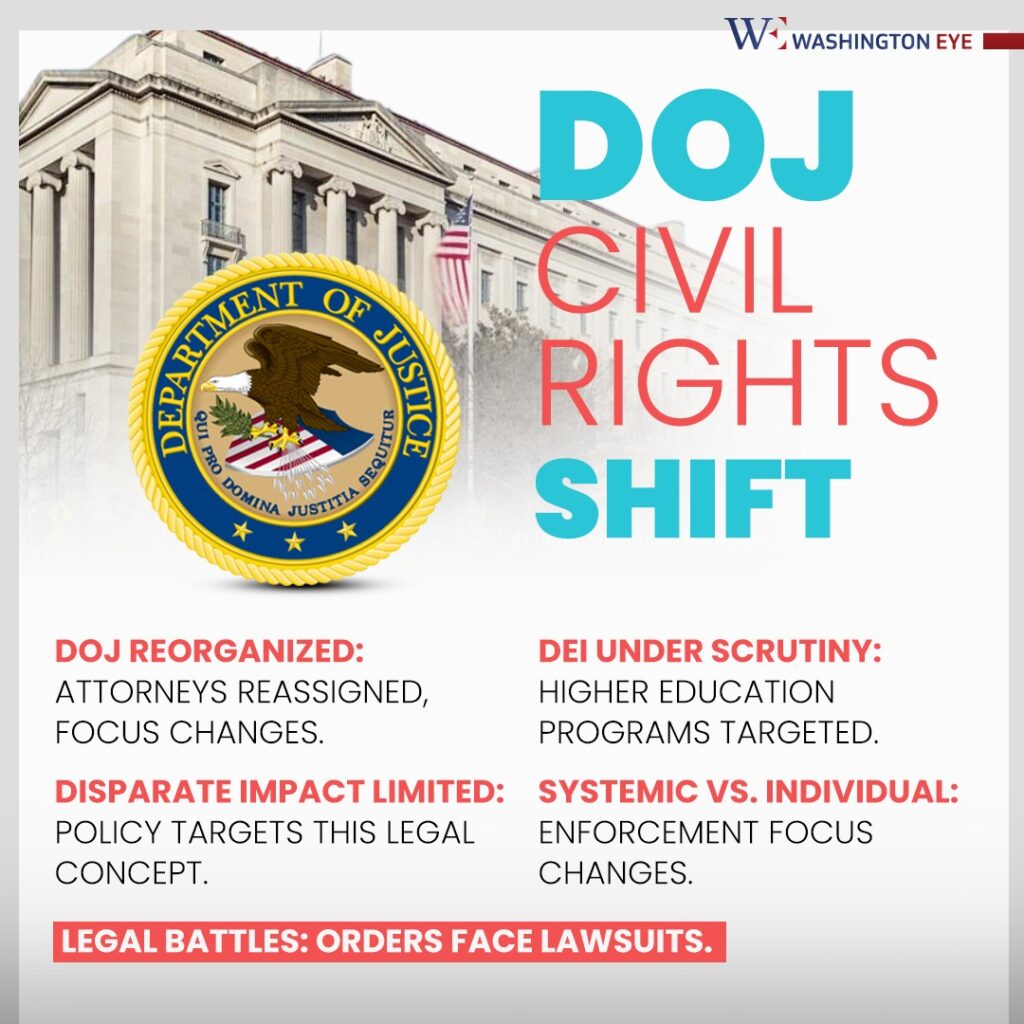The Civil Rights Division of the Department of Justice — historically the federal government’s frontline against systemic discrimination — is undergoing one of its most dramatic overhauls in decades. Under President Donald Trump’s orders, a sweeping reshuffle of senior leadership and a stark pivot in enforcement priorities signal more than bureaucratic change: they represent a fundamental redefinition of civil rights governance in America. Beyond administrative disruption, these moves raise urgent questions about the future of equity, democracy, and federal commitment to marginalized communities.
A Restructured Civil Rights Division
Under the leadership of Assistant Attorney General Harmeet Dhillon, the DOJ has reassigned approximately a dozen senior career attorneys from the Civil Rights Division. These individuals, many with decades of experience, previously oversaw critical areas such as police misconduct, voting rights, and disability discrimination. The official rationale cites efforts to address heavy caseloads and backlogs. However, critics argue that this restructuring undermines the division’s foundational mission to protect marginalized communities.
This internal shake-up aligns with a broader administrative agenda that prioritizes issues like defending gun rights and reinterpreting protections for transgender individuals, marking a departure from the division’s traditional focus.
Dismantling Disparate Impact Protections
Central to this policy shift is an executive order aimed at eliminating the federal government’s use of “disparate impact” liability. This legal doctrine allows for challenges to policies that, while not overtly discriminatory, disproportionately affect protected groups. The executive order instructs federal agencies to deprioritize enforcement of regulations based on this principle and calls for the revision or repeal of related provisions in the Civil Rights Act of 1964.
While the executive order cannot unilaterally eliminate disparate impact protections—given their grounding in the 1971 Supreme Court decision Griggs v. Duke Power Co.—it represents a significant shift in enforcement priorities. Legal experts note that dismantling these protections would require demonstrating their unconstitutionality, a substantial legal hurdle.
Targeting DEI Initiatives in Higher Education
In a move extending beyond the DOJ, President Trump signed an executive order targeting Diversity, Equity, and Inclusion (DEI) programs in higher education. This order overhauls the accreditation process that determines eligibility for federal student loans and grants, scrutinizing accrediting bodies that support DEI initiatives. The administration argues that these programs represent ideological overreach and advocates for a focus on core academic subjects.
Critics contend that this policy politicizes the accreditation process and threatens the autonomy of educational institutions. The American Association of University Professors, among others, has expressed concern over the potential chilling effect on academic freedom and diversity efforts.
Implications for Civil Rights Enforcement
The cumulative effect of these actions suggests a strategic realignment of federal civil rights enforcement. By deprioritizing disparate impact analyses and targeting DEI programs, the administration is shifting the focus from systemic discrimination to individual merit-based assessments. This approach raises concerns about the government’s commitment to addressing structural inequalities and protecting vulnerable populations.
Legal challenges are already underway. Civil rights organizations have filed lawsuits arguing that these executive orders violate constitutional protections and federal statutes. The outcomes of these cases will be pivotal in determining the future landscape of civil rights enforcement in the United States.
A Final Note
This transformation at the DOJ is not a mere changing of the guard — it is a deliberate recalibration of the federal government’s approach to civil rights. By sidelining the principles of disparate impact and de-emphasizing DEI efforts, Trump’s strategy seeks to recast civil rights enforcement in a way that privileges individual claims over systemic accountability. As legal battles loom and institutions adjust, the long-term stakes are profound: whether the architecture of civil rights protections built over the past 60 years can survive, or whether a new, narrower vision will take its place.















